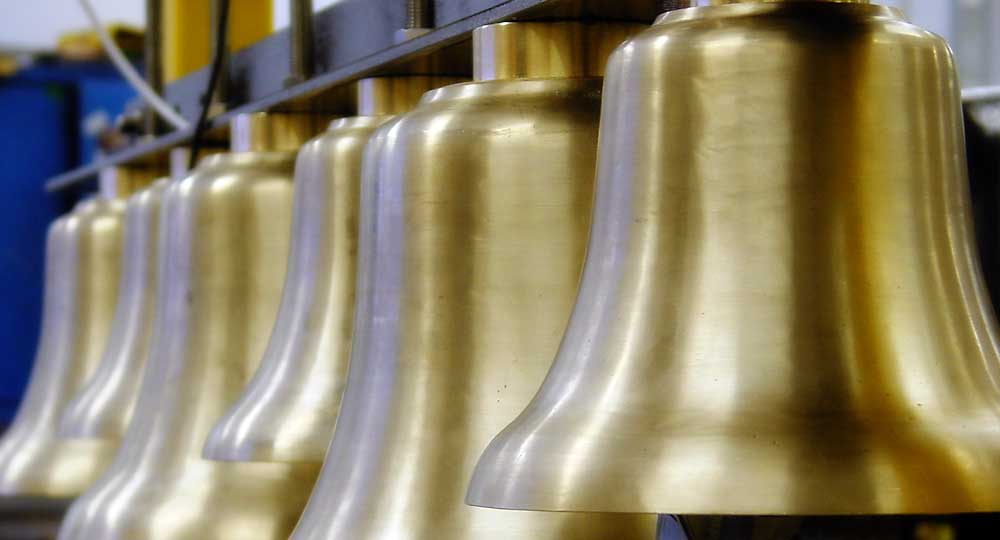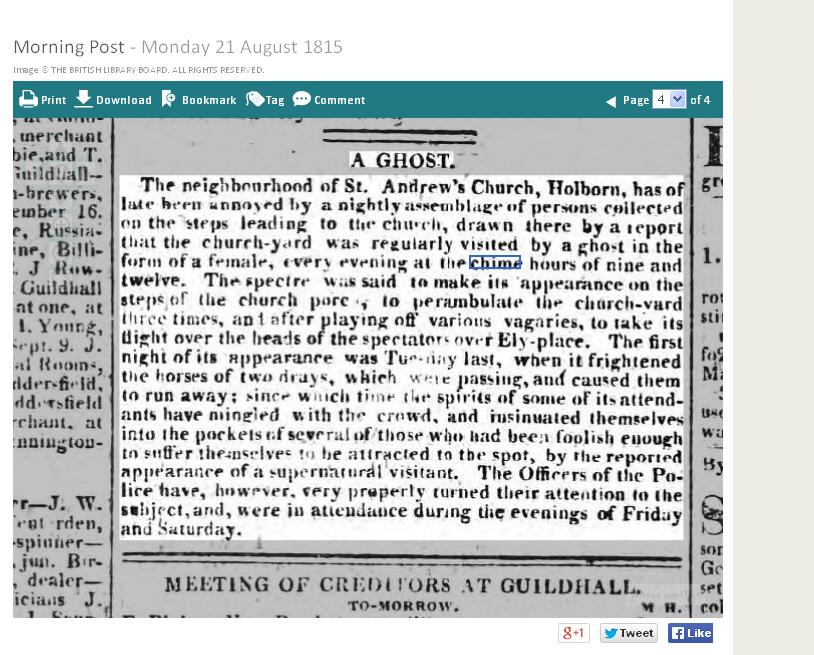Chime Hours and Chime Children January 3, 2015
Author: Beach Combing | in : Contemporary, Modern , trackbackThe ‘chime child’ was born at a magic time of the night (the times varied but involved bells). She or he had psychic abilities; think of it as a temporal version of the seventh son or the caul. The idea of chime children has become an increasingly popular one in recent years. Beach typed in ‘twenty-first’ century into Google Books with ‘chime child’ and immediately came up with, for the last decade, some glitzy looking volumes: Levinson, Dreams of the Road; Slater, Skinned; Garfield, Empty Sleeve; Billingsley, The Chime Child; Billingsley, Chime; and Storey, Almost a Chime Child. Soon an American TV channel will have a hero on one of their supernatural shows announce ostentatiously: ‘I popped out of Mom while the bells were ringing’. Silence will fall in the rural Kentucky bar and five or six stand-bys will say ‘a chime child!’ But waiting for the meme to germinate let’s ask the historian’s question: where on earth does the ‘chime child’ come from?
The answer to this question is simple, at least for the twenty-first century: Ruth Tongue (obit 19 Sept 1981). Ruth Tongue was a British folklorist who claimed that much of her special knowledge of Somerset folklore came from the fact that she was a ‘Chime Child’. RT didn’t stress the psychic side of the formula, though a careful reading of her works shows that she believed she had psychic gifts. She claimed, instead, that as a child she was trusted by rural types in Somerset because she was born at the right time: in her case between midnight on Friday and cock-crow on Saturday. ‘Many strange doors were open to Ruth… and the country folk spoke openly to Ruth of their secret lore.’ The problem was that Ruth Tongue proved to be the Baron Munchausen of British folklore, making up much of the traditions she peddled. She was, incidentally, a natural and gifted story-teller: she could have had far more success using her God-given talents as they were intended. Oh Ruth!
The modern idea of a chime child, in any case, began with RT’s claims. In 1968 she even published a book with Chime Child in the title: The Chime Child or Somerset Singers. Almost all modern examples trace back to her work in the 1960s and the 1970s and the myths that she wound around herself. But some folklorists have suggested that Ruth Tongue made up not only the tales and songs she passed on, but also the very tradition of the chime child. As it happens Ruth very possibly told fibs about being born early on a Saturday morning. But the chime child needs to be saved from the refuse of her life’s work: one of the problems when fantasists are let loose in a discipline is not just the lies they introduce but the truths they tar through association. There follows a brief history of the chime child as it appeared in nineteenth-century records.
One text that demonstrates that there was a Somerset tradition, along the lines suggested by RT, appeared long before her father was a glimmer in her grandmother’s eye.
‘Chime hours,’ ‘A child bom in chime-hours will have the power to see spirits.’
This was reported in J. Westby Gibson, Notes and Queries 7 (1853), 152 and ascribed to ‘a Somerset Friend’. However, there are other proofs that there was an idea of this kind in the nineteenth-century air and possibly for many centuries previously.
In the North of England it is believed that children born during the hour after midnight have the power through life of seeing the spirits of the departed. In the Eastern district [Norfolk], however, this faculty of seeing much that is hidden from others is given to children born at the ‘chime hours,’ i.e., the hours of three, six, nine, or twelve. (Glyde, Norfolk Garland, 1872)
The idea seems to have been well-established in East Anglia, in fact. This one is from Suffolk.
Babies born during ‘chime hours’ have the faculty of seeing spirits and cannot be bewitched. The chime hours are three, six, nine, and twelve, though an old nurse of the writer’s acquaintance stated them as four, eight, and twelve. Gurdon, County Folklore Suffolk, 1893 p. 11
This one is from ‘the Broads’ in Norfolk: it is written in a comic vein but…
I ain’t no more superstitious than other folks, but yew don’t perhaps know that old X wuz born in chime hours; he is the seventh son of a seventh son, and if that don’t constitoot a ‘wise man,’ then there never wuz one. Suffling, The Innocents on the Broads, 1901, 187
This one relates to the Midlands and North
Children who are born during the ‘chime hours’ of a parish church clock, that is, at the hours when musical tunes are chimed, have the power to see spirits. Oldall Addy, Household Tales, 1895, 119
This one is from Lean’s Collectanea. ‘Bray’ is presumably The Borders, but Beach knows that book well and has never seen this sentence.
A child born at midnight, or in the chime hours, will be ghost-free all its life. — (Devon) Bray.
Even though terms change the idea remains: this is from Scotland:
The child born [in Sutherlandshire] at midnight will grow up to ‘see things’ hidden from others — to have, in short, the gift of second sight. Gun and Mackay, Sutherland (1897), 117
And lest there is any doubt that these are obscure beliefs being peddled by incorrigably rural sorts this comes from a novel by the name of David Copperfield
In consideration of the day and hour of my birth, it was declared by the nurse and by some sage woman in the neighbourhood who had taken a lively interest in me several months before there was any possibility of our becoming personally acquainted, first, that I was destined to be unlucky in life, and, secondly, that I was privileged to see ghosts and spirits ; both these gifts inevitably attaching, as they believed, to all unlucky infants of either gender born towards the small hours of a Friday night.
Interstingly though Joseph Wright missed the term in his Dialect Dictionary, only writing it up afterwards in his additions.
There seem to be several points of debate.
First, where do these traditions occur? On the basis of this all of England save perhaps the west Midlands and the South East were implicated.
Second, what are the chime hours? As can be seen with the times there is great variation, the charming ecumenism of folk belief. Still it would be fun to know the range. Personally, Beach is a purist and believes that only babies that come out on the chimes of midnight should have bells ringing from them. By Ruth Tongue’s rather broad definition one in fourteen people are chime children, not exactly an exclusive club.
Third, what did membership of the club get you? RT claimed musical abilities, some others claim psychic abilities, and some an absence of ghost sightings (the opposite to psychic ability then?).
Fourth, it would be nice to find some twentieth-century reference prior to the RT revolution.
Fifth, are there other terms? Note the reason a lot of these references has not been turned up before is because we follow RT’s ‘Chime Child’ (her coining?), whereas the preferred nineteenth-century term is a child ‘born in the chime hours’.
Finally, Beach should note that there are a wide range of references in Notes and Queries that he can’t get at because they are behind an unpayable pay wall. The few he has glimpsed seem to be about the nature of bell ringing. This post is published, then, with historian’s guilt.
Any help? drbeachcombing AT yahoo DOT com
3 Jan 2015: Chris from Haunted Ohio Books: ‘Reinforcing the broad nature of the “chime hours”:’Children born at precisely 12 midnight are supposed to be endowed with occult powers. So, too, are those born at the “chime hours”–i.e. 3, 6 and 9.’ Pearson’s Weekly 1905. Southern Man, meanwhile, has found this reference on the Holborn ghost and ‘the chime hours’:
T’le neighbourhood of St. Andrew’s Church, Holborn, has of late been annoyed by a nightly assemblage persons collected on the steps leading to the church, drawn there hy a report that the church-yard was regularly visited a ghost in the form of a female, every evening at the chime hours of nine and twelve. The spectre was said to make itsappearance on the steps of the church porch, perambulate the church-yard three times;, and after playing off various vagaries, to take its flight over the heads of the spectators, over Ely-place. The first night of its appearance was Tuesday last, when it frightened the horses of two drays, which were pa-sing, and caused them to run away: since which time the spirits of some of its attendants have mingled wiih the crowd, and insinuated themselves into the pockets of several of those who had been foolish enough to suffer themselves to attracted to the spot, by the reported appearance of a supernatural visitant. The Officers of the Police have, however, very properly turned their attention to the subject, and were attendance during the evenings of Friday and Saturday.




